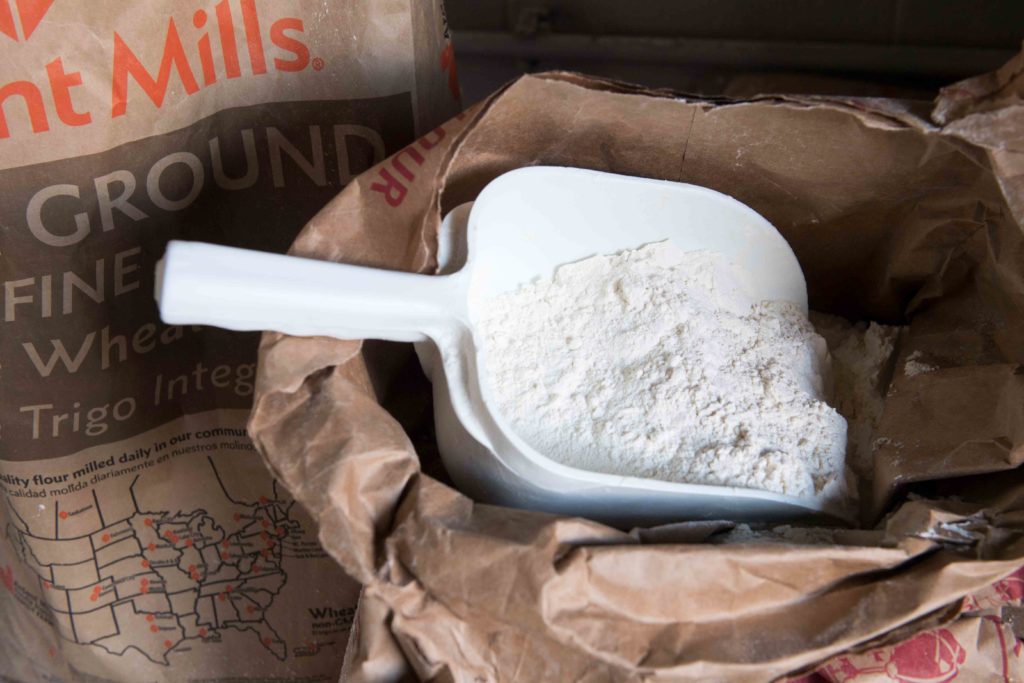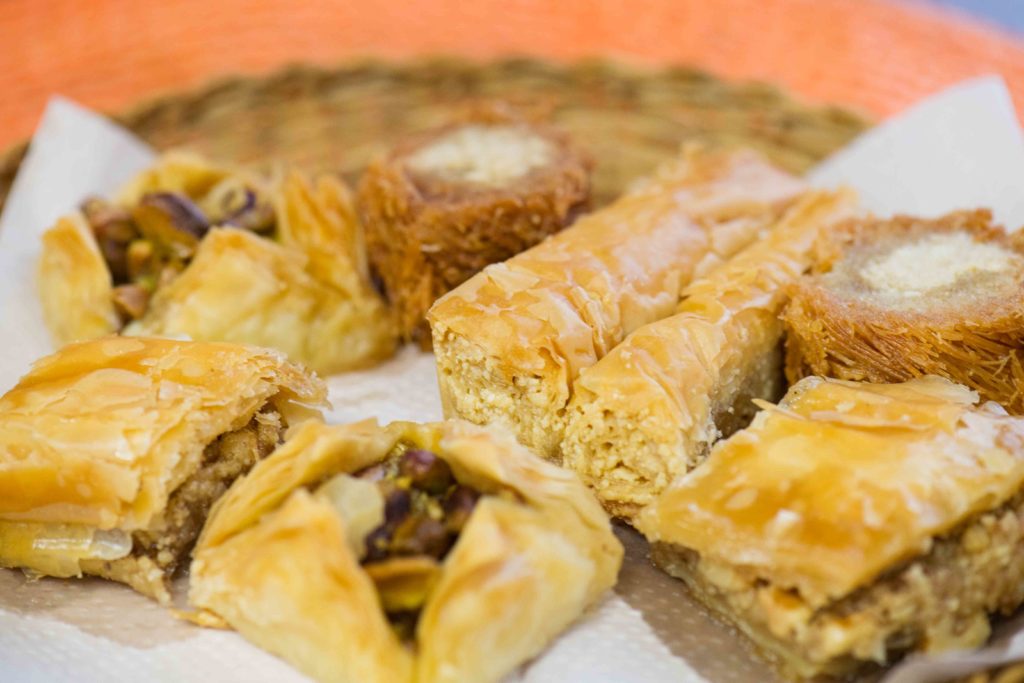Baked in Success
At Ameera Bread, Ahmed Abbas finds a growing market for dishes inspired by his home country of Iraq, and beyond.

Baked in Success
At Ameera Bread, Ahmed Abbas finds a growing market for dishes inspired by his home country of Iraq, and beyond.
Issue: January 2020
By: Susan Axelrod
Photography: Nicole Wolf
When Ahmed Abbas was planning to leave his native Iraq for the United States, he wanted to find out everything he could about where he was headed. He intended to join his sister in Portland, and when a Google search turned up Portland, Oregon, he expected to land in a city with views of snowcapped mountains and rainy weather. Shortly before he left Iraq to travel halfway around the world, he learned there was another, much smaller, and sunnier Portland on the East Coast. “I’m lucky,” says Abbas, who arrived in Maine in 2012. “The winters are a little colder, and there’s more oxygen. As soon as I got here I noticed people were smiling; they were peaceful and welcoming.”

In Iraq, Abbas was an electrical engineer, but would have needed additional schooling and licensing to continue that work in the United States. Instead, he worked at Barber Foods and then at Tandoor Bread and Restaurant on Forest Avenue, where he learned to make the breads that are the foundation of his business. With a loan from Coastal Enterprises, Inc. (CEI), he bought the humble bakery and takeout shop in 2014, renaming it for his then-newborn daughter, Ameera. He opened a second Ameera Bread in the Public Market House in Monument Square in 2015.
Ameera Bread on Forest Avenue is spartan yet cheerful, with just two tables, sunny yellow walls, and well-organized menus with photos of the food displayed above the main counter. On one side of the small space, an urn dispenses hot black tea with cardamom underneath a handmade wooden sign reading “Ameera Bread…different because…it’s made with love.” A refrigerator and freezer hold takeout containers of dips, salads, and stews, and a countertop case displays trays of crisply fried samosas—pastry triangles with beef, chicken, veggie, or spinach and cheese filling—and an array of pastries made with filo dough. While Ameera Bread has developed a devoted following, Abbas and his staff are patient in explaining the food to newcomers who either seek out or stumble upon the small storefront, which is set back from the street.

Abbas says he would eventually like to have a more formal restaurant, but he has been careful to grow the business gradually. At first, he offered just hummus and falafel as well as samoon, the football-shaped bread of Iraq, and the Iraqi interpretation of naan, which, while it is baked in a tandoor oven, differs from the Indian version in that it is twice the size and made without oil. “Iraq was invaded by the British Army for a long time, and many of the soldiers were from India; it impacted our food culture,” says Abbas. Over time and in response to customer requests, he added appetizers and salads, such as baba ganoush, dolma, and tabouli, and hot dishes, including beef and chicken shawarma. The current menu crisscrosses the Middle East and the Mediterranean to include dishes from Greece, Syria, Lebanon, Israel, and Iran, along with Iraq.
Its exterior lightly charred from the panini press, the beef shawarma sandwich takes the chill off a raw November day. In Iraq the meat would be stuffed into samoon, but here Abbas wraps it in naan with lettuce, tomatoes, and tangy tzatziki. “People like the idea of less carbs,” he says. The deeply flavorful beef has a slight chew, an appealing contrast with the toasty bread and creamy sauce; Abbas starts with beef knuckle meat, marinating it with spices, garlic, olive oil, tomato juice and paste, and lots of lemon before it is threaded onto a vertical spit and roasted for six hours. The sandwich is served with tangy sticks of raw pickled beets and turnips, which also accompany a plate of hummus dusted with sumac and four fat discs of sesame-seed-flecked falafel, hot from the fryer and drizzled with pickled mango sauce. Abbas explains that in Syria and Jordan, tahini sauce is traditionally served with falafel, while the mango sauce, called amba, is popular in Iraq and Israel. (Amba is the word for mango in Marathi and additional evidence of the Indian influence on Iraqi cuisine.)

Sandwiches, such as this beef beef shwarma, are wrapped in naan and grilled on a panini press. 
A plate of falafel with mango sauce, hummus with sumac, and raw pickled beets and turnips. 
Samosas are avail-able with beef, chicken, veggie, or spinach and cheese filling.
The rest of the menu may cover broader ground, but the desserts, baked by Abbas and his wife, Hadeel, are all from Iraq. Kunafa, a cream-cheese filled square of orange-tinted shredded filo, soaked with syrup and scented with cardamom, is far less sweet than one might anticipate, as are two versions of baklava—one with walnuts and one with cashews—and another filo-based pastry called a bird’s nest, filled with pistachios.
For Abbas, cooking was not a passion he turned into a career; it was a necessity that has become his calling. “I like to eat, but I was a very bad cook in the past,” he says. “I used spices in the wrong way and combined things that made it even worse.” Through trying recipes he finds mostly online, seeking out high-quality ingredients, and expanding his repertoire slowly, he has gained skill and confidence. “Doing this as a career pushed me to think about understanding and taking it seriously,” Abbas says. His persistence and contributions to the community earned him a 2019 Minority-Owned Small Business of the Year Award from Maine’s office of the U.S. Small Business Administration. He has been able to hire another baker to help him with the daily baking, which begins at midnight and finishes at 5 a.m. His bread is served at three Portland restaurants, and once a week he delivers it to Boston markets and restaurants.

Abbas hopes to open other Ameera Bread locations in Maine, and to introduce his customers to less familiar foods of his homeland. (Like hot dogs and pizza, falafel and shawarma are more likely to be casual snacks than what Iraqis sit down to for dinner.) He has several stews ready to go in the freezer, such as qeema, lamb with chickpeas and dried limes. “The Iraqi dining table always includes stew, rice, and bread,” says Abbas. “It’s rich and tasty, and warms you up from the inside.” This sounds like a good recipe for winter nights in Maine, where Abbas’s culinary and cultural contributions make his arrival here a lucky event for us, too.

